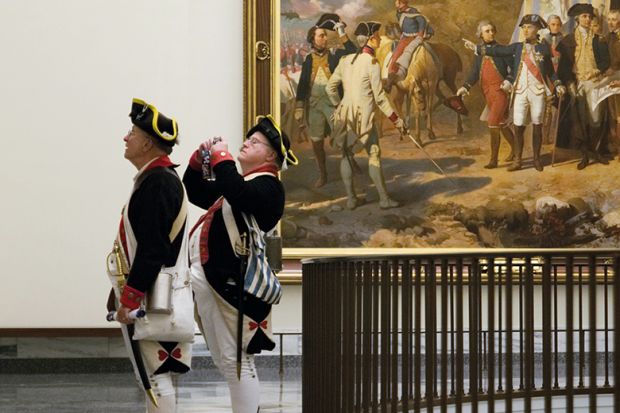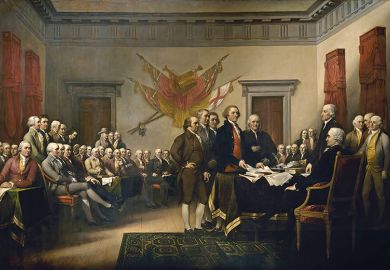If a car backfires in Piccadilly Circus and a pickpocket slips a wallet from the vest of a distracted pedestrian, did the car cause the theft?
To Begin the World Over Again is a captivating journey through the decade in which America wrestled with the British Crown. Readers will enjoy Matthew Lockwood’s vivid descriptions of a gentlewoman seized by British pirates off Calicut, Catherine the Great’s sly manipulation of great power politics, Horatio Nelson’s escape from the dull life of a vicar’s son and the Qianlong Emperor’s Sisyphean quest to keep opium out of China. But anyone waiting for the author to nail his argument that the “American Revolution devastated the globe” will wonder where his hammer went.
Ranging across five continents, Lockwood unearths the events of the day in clever prose that interweaves individual stories of larceny, licentiousness, heroism and bravery with excellent synopses of major political developments. Dreamers and rogues bring to life the twists of fate that eroded some of the greatest empires of all time and – ironically – help build the largest. “Not only did Britain avoid utter ruin,” Lockwood correctly observes, but “more than any of its rivals it emerged from the war strengthened”. That magic trick alone is worth observing close up.
Lockwood’s argument is less deft. His 13 chapters fail to include the obvious one on the event most clearly linked to developments in America – namely, the French Revolution. The Marquis de Lafayette sailed home with visions of bringing liberty to his homeland. Support for the American war had drained the French Treasury (anaemic since the preceding global conflict), and the Declaration of the Rights of Man mimicked the Declaration of Independence. American actuation of liberal ideals was inspiring.
Yet Americans can hardly take credit for the ideals, imported from the French Enlightenment. And it was Englishman John Locke who earlier penned the phrase that all men have a natural right to “life, liberty, and property”. So what triggered the epic unrest of modernity? Equally logical causes are the English Civil War or the Protestant Reformation that prompted it.
Curiously, Lockwood neglects commonsense examples in favour of tangential ones such as the British conquest of India (at which the Empire had long nipped), the invention of terrorism (although Guy Fawkes planted gunpowder under Parliament a century earlier) and expansion into Australia (charted by James Cook before the American Revolution). True, Australia became a convict colony because Georgia no longer served. One jail closed and another was found. Is this causation? The American Revolution had implications for Australia and other regions, but it’s a stretch to assert that it “devastated the globe”.
We might fault marketing hyperbole – titles sell books – except that Lockwood has a polemical purpose: to “entirely upend the myths of America’s conception” and show that the “sainted founders” produced a more reactionary world overall. But the bogey of American exceptionalism is a straw man. The author follows a long line of critics in asserting that the US is not all it’s cracked up to be. Their claims have long dominated academia. They provide little insight at a time when Vladimir Putin and his fellow authoritarians declare the liberal order that shelters such scholarship kaput.
Lockwood constructs a mountain of interesting evidence. One just wishes that his view from the top was more far-sighted.
Elizabeth Cobbs is Melbern Glasscock professor of American history at Texas A&M University and the author of American Umpire (2013).
To Begin the World Over Again: How the American Revolution Devastated the Globe
By Matthew Lockwood
Yale University Press, 536pp, £25.00
ISBN 9780300232257
Published 10 September 2019
POSTSCRIPT:
Print headline: The bogey of US exceptionalism
Register to continue
Why register?
- Registration is free and only takes a moment
- Once registered, you can read 3 articles a month
- Sign up for our newsletter
Subscribe
Or subscribe for unlimited access to:
- Unlimited access to news, views, insights & reviews
- Digital editions
- Digital access to THE’s university and college rankings analysis
Already registered or a current subscriber?








